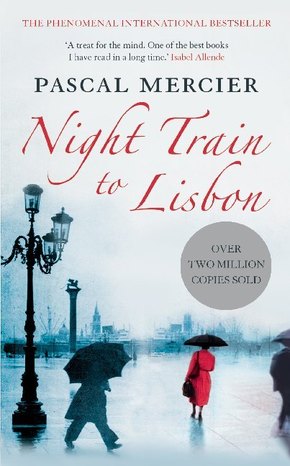
| Verlag | Faber & Faber |
| Auflage | 2007 |
| Seiten | 448 |
| Format | 17,8 cm |
| Gewicht | 236 g |
| Artikeltyp | Englisches Buch |
| Übersetzer | Barbara Harshav |
| ISBN-10 | 1843547589 |
| EAN | 9781843547587 |
| Bestell-Nr | 84354758UA |
Raimund Gregorius, Lateinlehrer, lässt plötzlich sein wohlgeordnetes Leben hinter sich und setzt sich in den Nachtzug nach Lissabon. Im Gepäck: das Buch des Portugiesen Amadeu de Prado, dessen Einsichten in die Erfahrungen des menschlichen Lebens ihn nicht mehr loslassen. Wer war dieser Amadeu de Prado? Es beginnt eine rastlose Suche kreuz und quer durch Lissabon, die Suche nach einem anderen Leben und die Suche nach einem ungewöhnlichen Arzt und Poeten, der gegen die Diktatur Salazars gekämpft hat.
A huge international bestseller, with over 2 million copies sold worldwide, Night Train to Lisbon is an utterly compelling novel about one man's escape from a humdrum life in search of passion and spontaneity.
A huge international bestseller, with over 2 million copies sold worldwide, Night Train to Lisbon is an utterly compelling novel about one man's escape from a humdrum life in search of passion and spontaneity.Night Train to Lisbon tells the story of mild-mannered, middle-aged Classics scholar Raimund Gregorius. When, one afternoon, he walks out of his class while in the middle of giving a lesson, his uncharacteristic impulsiveness surprises him as much as his students. This break from his usually predictable routine is driven by two chance encounters that morning on his way to work - the first with a mysterious Portuguese woman, and the second with a book discovered in a forgotten corner of an old bookshop, the journal of an enigmatic Portuguese aristocrat. With the book as his talisman, Mundus finds himself boarding the night train to Lisbon on a journey to find out more about its author, Amadeu del Prado - who was this man whose words both haunt and compel him, seeming somehow c lairvoyant?
His investigations lead him all over the city, and bring him into contact with those who were entangled in Prado's life. Gradually, he makes unexpected friends and the picture of an extraordinary man emerges: a difficult, brilliant, charismatic man, a doctor and a poet, and a rebel against Salazar's dictatorship. And as Prado's story comes to light so, too, Gregorius himself begins his life anew.
Hurtling through the dark, Night Train to Lisbon is a rich tale, wonderful told, propelled both by the mystery at its heart and its evocative subject.
Rezension:
Night Train to Lisbon is a novel of ideas that reads like a thriller: an unsentimental journey that seems to transcend time and space. Every character, every scene, is evoked with an incomparable economy and a tragic nobility redolent of the mysterious hero, whom we only ever encounter through the eyes of others... Pascal Mercier now takes his rightful place among our finest European novelists. Daniel Johnson Sunday Telegraph
